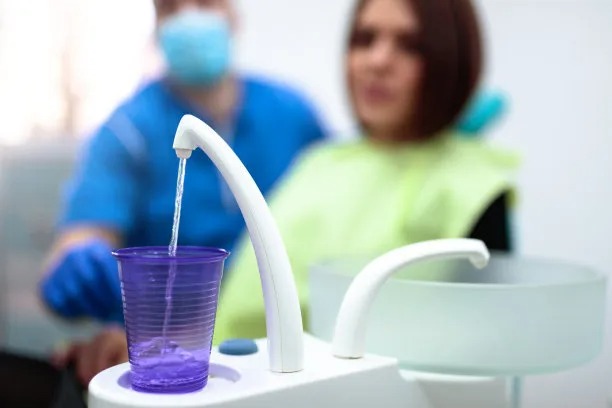Summary: Dental fillings are an essential procedure for restoring tooth function and health, yet many people experience anxiety before and during the treatment. This article outlines essential precautions to ensure both success and comfort during your dental filling procedure. We delve into four critical aspects: the importance of communication with your dentist, preparation before the procedure, the techniques employed during fillings, and aftercare that promotes healing. By addressing these points thoroughly, we aim to equip patients with the necessary knowledge to approach their dental filling appointment with confidence and ease.
1. Communication with Your Dentist is Crucial

One of the most vital precautions before undergoing a dental filling is establishing clear communication with your dentist. Before the procedure, express any concerns or anxieties you may have. Your dentist is trained to answer your questions and can provide detailed information about what to expect, which can significantly reduce pre-procedure anxiety.
Its also essential to discuss your medical history with your dentist. Inform them of any allergies, current medications, or previous dental experiences that could affect the procedure or your comfort. This information enables your dentist to tailor their approach and determine which anesthetics or techniques may be best for you.
Additionally, clarify the type of filling material that will be used. Options like composite resin, amalgam, or gold fillings each have their benefits and drawbacks. Understanding these options gives you a role in the decision-making process, easing worries about the outcome.
2. Proper Preparation Before the Appointment
Preparation is essential to ensure a comfortable dental filling experience. Start by arranging your schedule to minimize stress; consider taking the day off from work or responsibilities to focus solely on your dental appointment. This will help you feel more relaxed and composed on the day of the procedure.
Secondly, consider what you eat or drink before your visit. While having a light meal is advisable, avoid heavy or spicy foods that might upset your stomach if anxiety arises. Staying hydrated is also important; however, limit your intake an hour before your appointment to reduce the likelihood of discomfort during the procedure.
Finally, consider bringing a form of distraction with you, such as music or an audiobook. Having something to focus on during the procedure can significantly reduce feelings of anxiety or discomfort, allowing you to remain calm and relaxed throughout the visit.
3. Understanding the Techniques Used in Fillings
Being informed about the techniques used during dental fillings can significantly alleviate fears associated with the procedure. Dentists employ local anesthesia to numb the affected area, ensuring you don鈥檛 feel pain during the filling process. Understanding that this is a common and standard procedure can help dismantle preconceived notions about discomfort.
Moreover, recognize that the dentist will take careful measures to ensure a comfortable experience. For instance, they often use advanced tools such as dental lasers, which can help in minimizing discomfort while preparing the tooth for filling. Familiarizing yourself with these technologies can increase your confidence before the appointment.
Furthermore, some dentists incorporate techniques like sedation dentistry for anxious patients. Discussing the possibility of sedation with your dentist can help you feel more comfortable about going through with the procedure, especially if you believe you may have difficulty relaxing while in the chair.
4. Aftercare Tips for Comfort and Healing
After the filling procedure, following proper aftercare guidelines is essential for comfort and optimal healing. Start by allowing the anesthesia to wear off completely before eating or drinking to prevent biting your cheek or tongue. It might be wise to stick to soft foods for the first day, avoiding anything overly hot or cold.
During the first few days post-procedure, you might experience some sensitivity. Take over-the-counter pain relievers if necessary, but consult your dentist if discomfort persists to rule out any complications. They can provide tailored advice or treatments to ensure your comfort.
Finally, remember to maintain good oral hygiene after your dental filling. This includes brushing gently around the filling site and maintaining a regular flossing routine. Good aftercare practices will not only enhance your recovery but also prolong the lifespan of your filling, contributing to your overall oral health.
Summary:
In conclusion, dental fillings aid in restoring the health of your teeth but can evoke anxiety for many patients. By prioritizing communication with your dentist, proper preparation, understanding the techniques involved, and following aftercare guidelines, you can ensure a comfortable and successful dental filling experience. Empower yourself with this knowledge for a smoother journey towards dental health.
This article is compiled by Vickong Dental and the content is for reference only.
Vickong Dental
Vickong Dental is a large medical group established in Hong Kong in 2008 by professors from well-known medical universities in Guangdong and Hong Kong, as well as medical doctors from key national '985' universities (including Master's supervisors and senior professors). The chain of branches brings together expert dentists with PhDs and Master's degrees from Hong Kong and Mainland China, committed to providing high-quality dental treatment.
"Vickong Dental Practices the University Motto of 'Healing and Serving Society,' with a Stable Operation for Sixteen Years. It Has Been honored with Hong Kong Enterprise Leaders's Choice,' and is a Global Trusted Implant Center for the Nobel Implant System. Recommended by Hong Kong Metro Broadcast and Guangdong Television, it Serves Customers from Over Thirty Countries and Regions, Gaining the Trust and Favor of Citizens from the Guangdong-Hong Kong-Macau Greater Bay Area and Surrounding Cities.

Thousands of customers' unanimous praise
The most recognized and highly recommended dental service by customers in the Guangdong-Hong Kong-Macau Greater Bay Area
We Ensure You Receive Detailed Care and Attention Here
Hong Kong standards, Shenzhen prices, Your Trusted English-speaking dentists

Vickong Dental Medical-Grade Instrument Disinfection Process
Vickong Dental Medical-Grade Instrument Disinfection Process

Vickong Dental Chain: A Warm and Comfortable Environment for Treatment






Appointment Hours

Q&A
Why choose Vickong Dental?
Vickong Dental practices the university motto 「Medicine to Benefit Society」, with each branch bringing together highly qualified dentists with doctoral and master’s degrees from Hong Kong and the Mainland, and has maintained seventeen years of steady operation。Recipient of 「2024 Hong Kong Enterprise Leaders Brand」, 「2025 Hong Kong Enterprise Leaders Brand」, a Nobel Biocare Global Trusted Implant Center, and a brand recommended by Metro Radio Hong Kong and Guangdong TV。
To date, we have served customers from more than thirty countries and regions,earning exceptionally high word-of-mouth recognition and trusted recommendations from residents across the Guangdong-Hong Kong-Macao Greater Bay Area and surrounding cities
We have eight major branches in Zhuhai、Shenzhen,and a consultation and service assurance center in Hong Kong,so you can book a free consultation at any time for any questions,which is very reassuring.
If I do not accept the quotation after the CT scan, will I be charged??
No! As long as the actual treatment has not started, you will not be charged any fees.
Will there be any additional charges during the treatment process?
No, there won’t be any additional charges. Before treatment begins, we will clearly explain the treatment plan and its corresponding fees. Only after the patient agrees and signs the consent form will we proceed with the dental service.
Can I pay in Hong Kong dollars?
Yes. Vickong Dental accepts payment in Hong Kong dollars. The amount will be converted based on the exchange rate of the day, and the applicable rate will be clearly communicated to you in advance.
Can I reschedule my appointment at any time?
Yes. Please contact us via **WeChat** or **WhatsApp** as early as possible, providing your original appointment time and details, along with your preferred new date and time slot for rescheduling.













